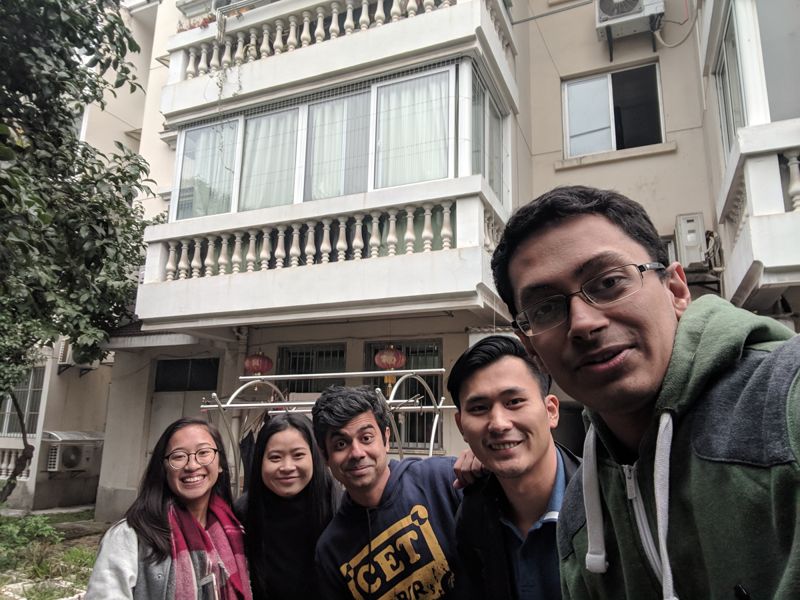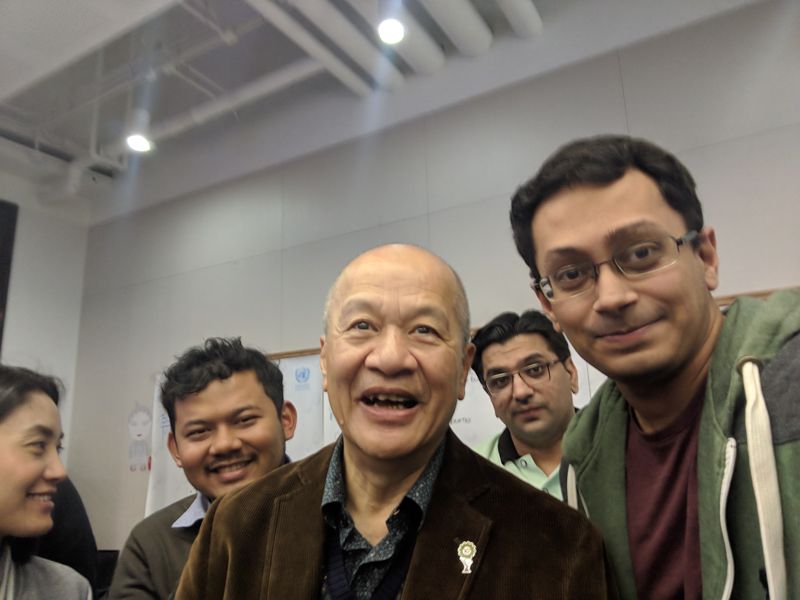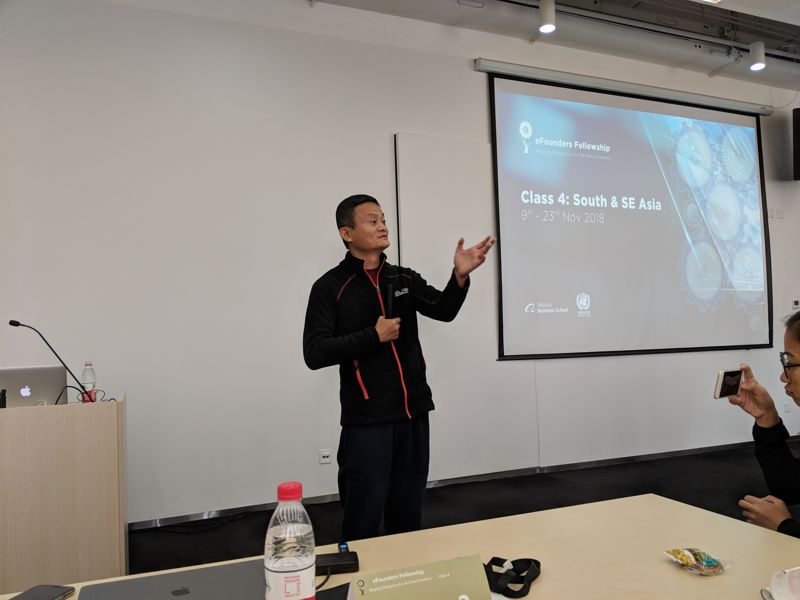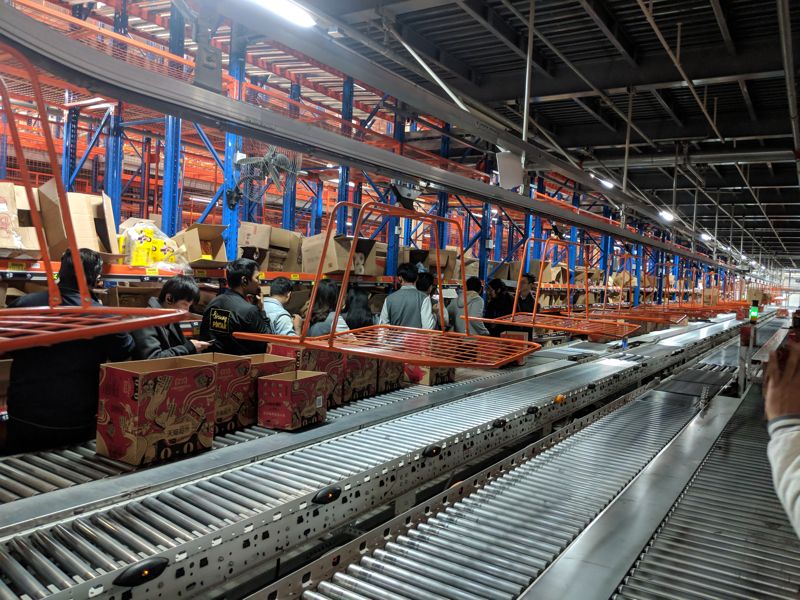
November 22nd, 12 PM. Our long waiting finally came to a close. Jack Ma, the founder of Alibaba, entered the room where 38 entrepreneurs and nextgen efounders from all over South and Southeast Asia were waiting anxiously for him and wondering whether the moment would really come to meet the legend.
For me, it was a rare emotional moment, I reckon I still feel the stir throughout my body. I admire a few people for their determination and tenacity, for their self-confident and hunger to prove that you could be equal to your dream, and look up to during my moments of doubt and trying. Alibaba Founder is one of them.
In a black jacket and a trouser, he looked simple. However, it took little effort to see the resilience and grit in his face. We stood up and clapped our hands when he entered the room and then sat down. The next one hour was a journey into life-changing learning on entrepreneurship, struggles, how you can survive and build a great business, not any business though, business as consequential as Alibaba. It was the best education I received so far on building things from scratch, more so because I was learning from someone who built a company that employees 70,000 people with 768B USD yearly GMV in just 20 years. In less than one lifetime.
I’m writing about my experience at Alibaba’s eFounders Fellowship program 2018, a two-week long program for entrepreneurs and innovators from South and South East Asia that provides first-hand exposure to ecommerce and digital innovations, access to business leaders across Alibaba and China, as well as an opportunity to connect with like-minded, leading entrepreneurs in your region. The program, which took place at Alibaba Headquarters, China, was a life-changing experience for me.
Here are the top 5 lessons I have learned from my time at Alibaba and Jack Ma as an eFounder Fellow.
Alibaba was founded in 1999. It struggled for the next few years until 2001. Initially, Alibaba tried to sell everything but it did not work. So they went back to the planning table, fixed their focus, set their mission and goals and resurrect. The rest is history. Alibaba captured market after market, one by one: B2B (Alibaba), B2C (TMall), C2C (Taobao), Cainiao (Logistics), Xian Yu (secondhand C2C), and the list goes on.
Later they expanded, through various investment, to bike-hailing (Hello bike), chart service (Dingtalk), travel portal (Fliggy), superstore (HEMA) and many more. Alibaba brought rural people into their platform (rural Taobao), created Alipay that offers a super convenient online payment system, Alimama (Alibaba's data and advertisement system), Alicloud (cloud server for Alibaba and other business) and to connect all the finance together Ant Financial (one of the biggest investor of Bkash).
Over the past 20 years, Alibaba has built a complete e-commerce ecosystem and now Alibaba aims higher and is planning to become an economy itself by 2035.
My most important takeaway from the experience would be: you have to be willing to endure difficulties, be open to challenges and take the opportunities each challenge has to offer to grow yourself as a person, as a team, and as a company. It comes down to one single fact, there will be challenges and problems but you have to understand how to play each challenge to your benefit.
While the story of Alibaba and what it has become is awe-inspiring but the real story behind how Alibaba has become Alibaba is even more inspiring and offers valuable insights into how to approach building a business.
The most important lesson I have learned from this part of the story is that: Alibaba didn’t build all of these businesses overnight. You can't build anything consequential overnight. They took a very systematic approach and built the Alibaba that we see over the period of 20 years.
I learned that initially, you have to focus on something that you are good at and the win it. Choose something small - preferably a village. You have to start with one village, win it, go to the next village and eventually capture the city. Now it is easy to say that you have to win the villages first but winning villages would not be easy. It would take blood, sweat and everything else that you have to win these villages. The journey will be enamored with struggles and challenges but it is okay. Challenges mean you are building something meaningful.
When Alibaba leadership team described their struggle, I felt more and more confident that we are on the right track at Styline. That we are not alone, Alibaba also had to endure those days.
Understanding the vastness and depth of Alibaba business is not easy but after two-weeks of direct mentorship from the people who are the real mastermind of this behemoth, everything looked obvious.
We had excellent exposure into how Alibaba operates and how the company slowly built into what it is today. The leaders of the company went deep in how it works but made the learnings simple enough so that we could understand the scope and opportunities. We learned about how Alibaba made expansion decisions, solved critical problems, which eventually we could apply to our business, how Alibaba makes decisions, how to manage growth and evolve your culture when you go from a 10 people company to a 50 people company and then 500 and 5000 and what are the challenges of the transition. We learned these lessons directly from people who built and implemented these things at Alibaba which made the experience even more exciting and authentic.
We visited Alibaba's rural Taobao project, a village where every family is involved into manufacturing that they sell in Taobao (and there are thousands of such villages), and Cainiao center where millions of parcels are being packed and dispatched every day and sent outbound.
To an early stage entrepreneur, the scale and complexities of a company like Alibaba are almost beyond comprehension.
My most important takeaway from the experience would be: you have to be willing to endure difficulties, be open to challenges and take the opportunities each challenge has to offer to grow yourself as a person, as a team, and as a company. It comes down to one single fact, there will be challenges and problems but you have to understand how to play each challenge to your benefit.

It is the team and the people what makes or breaks a company. Everyone in the team has to own the same mission. Everyone has to see and believe in the vision.
It is a race, if we don’t know what is the goal, we can’t run together. We have to know and understand other people who are on the same journey with us. The understanding between people, how they react in different situations, what are the strong and weak points - these things are of paramount importance. When vision and mission are in place and people in your team adhere and own, everything else falls into places.
What we have learned from the people at Alibaba is that they took these things very seriously from day one. At a very early stage of Alibaba when they were struggling, they took time and set a clear mission, a 20 years vision and put together some company values. Over the years they firmly embedded these values, vision, and mission into their culture through regular conscious reinforcement.
Company values are like pillars that hold your company together during both good and bad times. It helps the company build the culture and strategies, handle the situation through thick and thin, and make better decisions.
A very good example is when China was hit by the SARS virus. We learned in the program how Alibaba handled it. It was a critical time but they had the value clear in their mind “customer first” and every employee converted their homes into a workplace (SARS virus was contagious, so at that time it was restricted and risky to come to the office where the chance of getting caught in the virus was high). This is what owning your values and mission looks like.
The mission and values are so strongly believed by the employees when we went to the Alibaba Cafes after 7 pm, we saw every day it was full of people having dinner, not because the food is cheap there, but because they wanted to do more. We asked some of them and the reply was simple: they still have works to finish before going home. After all, building an extraordinary product and company needs extraordinary efforts and they believe in that.
This was such an amazing lesson for me that after returning I sat down with our leadership team Styline and brainstormed and polished our mission, vision, and values.
Today, I spend a good amount of time every week working on defining the culture more clearly. We have now built an entire onboarding process at Styline which is followed by a week-long training on our mission, vision, and values.
To our surprise, we have started getting results. We just finished our fall internship program and we saw how this core training on company values guided young interns take important decisions, understand how to react in different situations and complete work with integrity and passion.
One of the most important lessons for me from the program was the importance of being humble. Success often changes us but we have to be aware and must not allow any negative change in us. We have to learn to be humble and keep our feet on the ground when we achieve our greatest success. This is something I have learned from the people at Alibaba. During the 2 weeks programs, we met 5 members of the Alibaba founding team and they took sessions with us. There were other senior leaders from Alibaba leadership team. These people built Alibaba from scratch. Some of them are billionaires and most are millionaires but you can’t find the slightest hint of that in their talk and how they operate.

Leaders are visionary. They enable others. They empower people to achieve great things. If you want to build a good company, you probably don’t need many great leaders, but if you want to build a great company, you need people who can see the big picture, see beyond the surface and predict the future, build processes and systems, motivate other people by setting examples and are strong and committed enough to handle difficult situations.
Leaders know struggles don’t break you, they make you stronger. They don’t hesitate to take risks. They take responsibilities. They lead by setting examples, making people believe that things are possible.
Jack Ma, being a great leader, saw the 2008 world recession coming. Alibaba took three important decisions and acted upon that even before the recession hit the world economy, and thus was in better shape as a business. After the recession, Alibaba came out stronger and was much ahead of the competitors in the race.
At Styline, we are building a lifestyle platform to serve millions of customers. We understand that it is a long race. That it is a marathon. We need visionary people here who can read the future and then drive the company towards the goal.
We just launched our first leadership program keeping all these prospects in mind. We found out that some young people, though short in experience, have more hunger, passion, and talent to get ahead in career. They are not afraid of taking risks, working hard and doing what is unexpected. We are looking for people who we will train and prepare so that they can join our leadership team sooner. It will give them a better ground to play on their potentials. I believe we will soon start getting the benefits from the program when our training ends. You can learn more about the program here.
One of the most important lessons for me from the program was the importance of being humble. Success often changes us. But we have to be aware and must not allow any negative change to happen to us. We have to learn to be humble and keep our feet on the ground. When we achieve our greatest success, that's the time when we need to be more vigilant about our vices. This is something I have learned from the people at Alibaba.
During the 2-weeks programs, we met 5 members of the Alibaba founding team and all of them took sessions with us. There were other senior leaders from Alibaba leadership team. These people built Alibaba from scratch. Some of them are billionaires and most are millionaires but you couldn’t find the slightest hint of that in their talk and how they operate.
You can feel in the way they speak and conduct themselves how all these excellence in life made them wise and humble. You could feel their words, notice their determined faces but you would not find any arrogance there. Despite their huge success, they were keen to share their experiences, take our naive questions and still take time to reply to them meaningfully. Even one of them, Savio, former COO of Alibaba, took a flight from Hong Kong just to take a 2-hour session with us and he would fly back just after that.
I suddenly felt that meaningful and enduring success manifest itself very differently. People who are really success they are wise, confident and almost spiritual and conduct themselves very differently than the rest of us.
I have seen many successful people who spend a lot of time showing off their success by smart look and presentability as if the success would fade away if they are a bit less careful about it.
It was an amazing experience and different from anything we experienced before. It changed my perspective about success forever.
Leaders are visionary. They enable others and empower people to achieve great things. If you want to build a good company, you probably don’t need many good leaders, but if you want to build a great company, you need people who can see the big pictures, see beyond the surface and predict the future, build the process, motivate other people by setting examples and are strong and committed enough to handle tough situations.

The 2-week program started with the big shopping event on 11th November called the Singles day. It is the largest online shopping festival by any e-commerce company for a single day in the world (yes, it is bigger than Black Friday, Cyber Monday and prime day combined). Just to clear the fact, on the most recent Singles Day, Alibaba made over $30 Billion USD in one day and received more than 1 billion orders.
We had this opportunity to see the impact, magnitude, and power of the Singles day up close. They just made a shopping spree out of nowhere and positioned it as a shopping festival. People feel that they should not miss out the festivity, and they shop like crazy.
To give a small example of how huge it is, Alibaba rents big stadiums and organizes free carnivals, music events, and shopping festivals and invites everyone to join. The feeling is so contagious that you can’t resist but join the shopping spree because you will see all the deals and discounts in big screens and people all around you are purchasing everything and you would hate to fall behind.
The marketing campaign is so massive that everyone knows about it and look forward to it every year.
[su_divider top="no" divider_color="#adacab" link_color="#edde29" size="1"][/su_divider]
About the author: Khobaib Chowdhury is the Founder and CEO of Styline, a fast-growing modest fashion and beauty e-commerce marketplace based in Dhaka. He can be reached at khobaib@stylinecollection.com
Cover photo: Author, first from right, along with other eFounder program entrepreneurs in front of the apartment of Jack Ma where the Alibaba journey started
